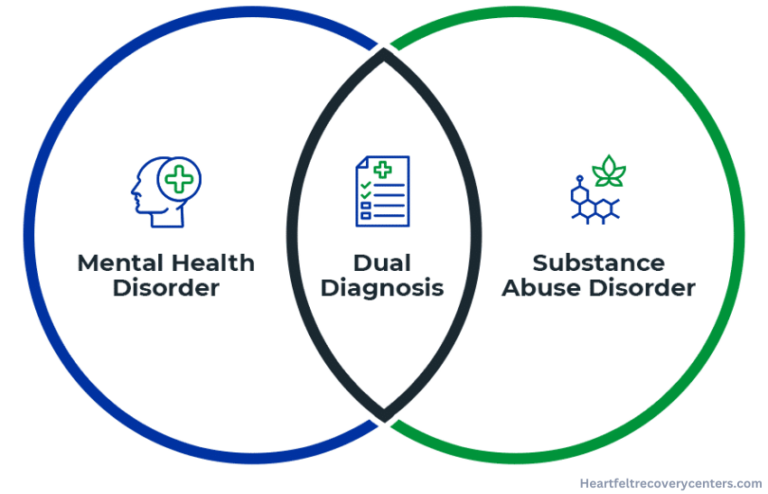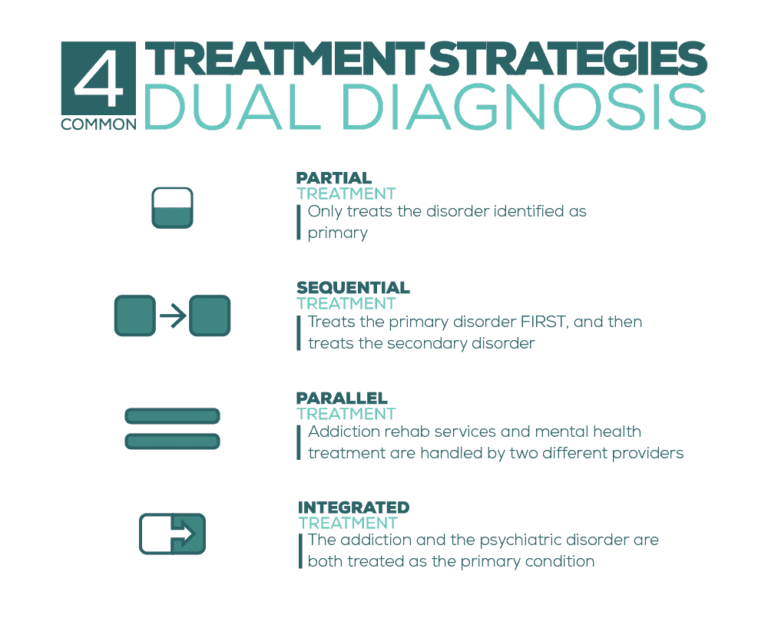Looking for dual diagnosis treatment near me? If you’re struggling with both addiction and a mental health issue, finding the right place that offers comprehensive care is crucial. This article will guide you through understanding dual diagnosis, finding nearby treatment centers, and knowing what you can expect from these facilities.
Key Takeaways
Dual diagnosis involves the simultaneous presence of a substance use disorder and a mental health disorder, necessitating integrated treatment approaches for effective recovery.
Finding an appropriate dual diagnosis treatment center is crucial; it should provide comprehensive care for both mental health and substance use disorders while considering insurance coverage.
Effective dual diagnosis treatment includes personalized care plans, evidence-based therapies like CBT and DBT, and the importance of support systems and aftercare in sustaining long-term recovery.
Understanding Dual Diagnosis

A condition known as dual diagnosis, or co-occurring disorders, occurs when an individual has both a mental health disorder and a substance use disorder concurrently. It’s more prevalent than often recognized. Almost half of all Americans who seek treatment for substance use issues also battle with a simultaneous mental health problem. The intricate connection between addiction and various mental health problems necessitates an integrated approach to treat both conditions effectively.
The challenge in treating dual diagnosis stems from the deeply intertwined relationship between the two types of disorders. Addiction, which is considered chronic, progressive, and without cure, can trigger or exacerbate existing mental illnesses like depression or anxiety. Inversely, individuals suffering from pre-existing mental health problems might resort to substance abuse as a misguided coping mechanism – this only aggravates their overall state over time. This reciprocal dynamic underscores the essential need for cohesive treatment strategies that address not just substance use but accompanying psychiatric conditions holistically.
An integrated treatment strategy aims at holistic healing by tackling both addiction issues and any concurrent psychiatric illness together. Such approaches significantly improve prospects for sustained recovery and general wellbeing among patients receiving care through these models – professionals across different healthcare disciplines work closely ensuring meticulous attention is given to every aspect of one’s well-being during rehabilitation.
Identifying Dual Diagnosis Treatment Centers Near You

It is essential to select the right facility for dual diagnosis treatment. Around half of all substance use recovery centers offer specialized programs aimed at treating dual diagnoses, but only a fraction of people get treated for both their mental health and substance use disorders simultaneously. This discrepancy underscores the importance of finding centers that deliver all-encompassing care.
When searching for an appropriate dual diagnosis treatment center, it’s crucial to ensure that the institution offers integrated services addressing both mental health issues and substance use concurrently, as this comprehensive approach can significantly bolster rehabilitation efforts. It’s also important to check if your insurance plan includes coverage for such facilities since this may affect your choices.
Utilizing online tools can be beneficial in locating a suitable treatment center. Many local facilities’ websites provide specific information about their offerings including descriptions of their programs tailored toward individuals with a dual diagnosis like those offered by Heartfelt Recovery Centers in New Hampshire which include methods to initiate contact regarding its unique treatments. These instruments can assist you in pinpointing a nearby establishment equipped to cater specifically to your requirements.
Common Mental Health Disorders in Dual Diagnosis
Mental illnesses that frequently occur alongside substance use disorders encompass conditions such as depression, anxiety, and bipolar disorder. An estimated 37.9% of adults with a history of substance use also carry a mental health diagnosis, indicating a common coexistence between the two. The interplay between mental health and substance abuse can alter neurological functions, consequently increasing the risk for developing exacerbated mental health issues or intensified patterns of substance misuse.
The dual diagnosis often involves prevalent conditions like depression and anxiety in individuals grappling with addiction to substances. A vicious cycle emerges where symptoms of these mental ailments potentially lead to an escalation in using substances as a coping mechanism. This increase then aggravates existing psychological distresses Still—conditions such as post-traumatic stress disorder (PTSD), personality disorders, and generalized anxiety disorder are among other notable afflictions seen under this context.
Risk elements contributing to both realms –mental health disturbances and addictive behaviors – include genetic factors, environmental triggers, and experiences involving personal trauma. Acknowledgement of these contributory risks facilitates the construction of more tailored treatment solutions aimed at holistically addressing not just the addictive habits but any underlying psychiatric complications.
Assessing Your Need for Dual Diagnosis Treatment
Acknowledging the importance of dual diagnosis treatment is essential for healing. The presence of mental health disorders might reveal itself through extreme changes in mood, challenges with focus or having thoughts of suicide. Conversely, indicators of substance use disorders often include a retreat from social interactions, drastic alterations in behavior and developing greater substance tolerance.
It’s common for those experiencing mental health issues to turn to substances as a temporary solution to manage their struggles. Although this form of self-medication may offer momentary respite, it frequently exacerbates both the underlying mental condition and the resulting addiction over time. It’s crucial to recognize these tendencies and realize when seeking professional assistance becomes necessary.
Evaluating whether dual diagnosis treatment is needed can be complex because symptoms such as erratic moods, lack of concentration and isolating oneself are shared between addiction and other mental health conditions. Thus blurring lines that differentiate them. Conducting a professional assessment aids in distinguishing primary concerns, which informs selecting an appropriate therapeutic strategy.
Types of Dual Diagnosis Treatment Programs

Treatment programs tailored for individuals with a dual diagnosis are available in various forms, each offering unique levels of care and assistance. For those battling severe co-occurring disorders, an inpatient treatment program can be especially beneficial. It offers round-the-clock medical oversight within a highly structured environment. This degree of intensive care is designed to deliver constant support and surveillance as part of the dual diagnosis treatment regimen.
For patients who require significant structure but also need the ability to reside at home, Partial Hospitalization Programs (PHPs) present an optimal solution. PHPs involve attending 6 to 8 hours of therapy sessions daily while providing therapeutic interventions similar to those found within inpatient settings. Suited for patients post-detoxification who no longer necessitate around-the-clock monitoring, PHPs serve as a bridge between full hospitalization and outpatient services.
Conversely, Intensive Outpatient Programs (IOPs) afford more flexibility by requiring fewer weekly hours dedicated to treatment—typically about 9—which accommodates individuals juggling additional responsibilities alongside their recovery process. With durations ranging from one month up to three months on average, both IOPs and PHPs incorporate individual plus group counseling sessions that address the intricacies involved in dual diagnosis treatment scenarios.
Effective Therapies for Dual Diagnosis
Treatment for dual diagnosis is greatly reinforced by the application of effective therapies. Utilizing Cognitive Behavioral Therapy (CBT), individuals with co-occurring disorders can alter detrimental and false thought patterns. CBT imparts vital coping mechanisms necessary for handling concurrent conditions such as depression and anxiety.
An additional beneficial modality, Dialectical Behavior Therapy (DBT), concentrates on:
Mindfulness
Emotional regulation
Interpersonal effectiveness
Distress tolerance
These competencies are crucial for those dealing with dual diagnoses, allowing them to regulate their emotions and social interactions more constructively. Both CBT and DBT contribute to emotional balance while tackling mental health complications resulting from substance use, fostering a thorough healing journey.
Comprehensive treatment plans in integrated settings are bolstered by holistic methodologies combined with evidence-based practices. Modalities including individual therapy, group sessions, and family interventions pave the way toward an all-encompassing recovery process. Such multifaceted approaches in dual diagnosis programs aim to collectively target both mental health challenges and substance use issues effectively.
The Role of Medical Detox in Dual Diagnosis Treatment
The initial phase of dual diagnosis treatment typically involves medical detoxification, a vital process that meticulously rids the body of drugs and alcohol. With expert supervision, this step mitigates withdrawal symptoms, enhancing safety and manageability. Successfully navigating through detox greatly diminishes the risk of relapse by offering essential support throughout the period of substance withdrawal.
Laying a robust groundwork for continued recovery efforts is central to effective diagnosis and treatment. The removal of substances from one’s system equips individuals to more effectively participate in subsequent therapeutic measures aimed at addressing both mental health disorders and issues related to substance use. Such preparation is indispensable for securing enduring sobriety and emotional well-being.
Personalized Treatment Plans
An effective dual diagnosis treatment hinges on the creation of a tailored treatment approach. Such an approach takes into account the unique requirements associated with various mental health conditions and substance use disorders, ensuring that care is personalized. These plans are often comprehensive, embracing trauma-informed care to simultaneously treat addiction as well as any accompanying underlying trauma.
The malleability of personalized care is its strength, allowing for adjustments in the treatment regimen in response to changes in patient needs over time. This flexibility enhances patient engagement by catering specifically to their unique situations. By fostering cooperation between specialists in mental health and substance addiction treatments, this collaborative model guarantees all-encompassing care.
At facilities like Hickory Treatment Center focused on addressing co-occurring disorders through dual diagnosis treatment centers, strategies are carefully crafted to meet individualized requirements effectively. Such bespoke approaches tackle both facets—mental health conditions alongside substance use disorders—to ensure thorough intervention and support for recovery from addiction-related issues while managing psychiatric symptoms concurrently.
Integrated Treatment Approaches
Employing integrated treatment approaches is significantly more beneficial than uncoordinated efforts. Addressing mental health and substance use disorders concurrently ensures a complete approach that encompasses all aspects of an individual’s well-being. The field has recognized the urgent need for integrated care, which embraces both holistic techniques and treatments backed by scientific evidence.
Facilities specializing in integrated treatment deliver diverse therapies aimed at tackling both substance abuse and mental health disorders simultaneously to facilitate comprehensive healing. These centers often include practices such as mindfulness, dietary guidance, and physical exercise within their regimen of substance abuse treatment methods, thereby fostering crucial coping skills necessary for conquering both afflictions.
The role of social support cannot be understated within the framework of integrated treatment. It plays a pivotal role in diminishing substance use while bolstering outcomes related to mental health. Certified facilities with meticulous programs underscore the significance of incorporating physical activity along with social networks as pillars supporting recovery from mental health challenges.
Dual Diagnosis Treatment Centers New Hampshire
Support Systems and Aftercare

Crafting a tailor-made aftercare strategy is essential for the sustained sobriety of individuals dealing with dual diagnosis. This plan usually encompasses elements such as outpatient therapy, meticulous medication management, and active engagement in support groups. Dual-recovery specific mutual aid groups have been shown to yield superior results compared to conventional self-help assemblies.
Involvement in mutual aid tailored towards dual recovery has been associated with enhanced personal welfare and diminished distress related to mental health. There’s a positive relationship between the duration and regularity of attendance at support group meetings and an increase in perceived empathy and backing. The process of joining self-help communities plays a pivotal role by promoting self-efficacy while facilitating reintegration into social life following periods of seclusion.
Receiving spiritual guidance often correlates with improved wellness among those on their journey from dual diagnoses toward healing. When these layers of spiritual help are woven together within aftercare schedules throughout someone’s path to recuperation, they substantially boost prospects for achieving durable recovery as well as greater overall healthfulness.
How Much Does Dual Diagnosis Treatment Cost?
Health insurance typically provides partial or full coverage for the expense of dual diagnosis treatment, acknowledging it as a crucial health service. The extent of coverage for treatments concerning co-occurring disorders depends on the specifics of an individual’s insurance policy and if the selected treatment facility is within their provider network. Medicaid and Medicare also extend support by covering a range of services related to dual diagnosis treatment.
Those without health insurance have several options to explore: paying out-of-pocket, utilizing financing arrangements, applying for scholarships, or seeking help from state-funded rehabilitation centers. Awareness and utilization of these alternatives can greatly enhance affordability and accessibility when pursuing dual diagnosis disorder treatments.
Finding Accredited Dual Diagnosis Treatment Centers
When selecting a rehab facility for dual diagnosis treatment, it is crucial to evaluate the center’s accreditation status. This guarantees adherence to quality care criteria and ensures that the facility follows essential guidelines for delivering effective diagnosis and treatment.
The National Helpline provided by SAMHSA provides confidential and complimentary support to those needing help with substance use disorders or mental health issues. This service includes directing individuals towards suitable treatment centers. SAMHSA’s online locator aids in identifying accredited facilities catering to dual diagnosis based on geographical location.
By leveraging these tools, one can secure a rehabilitation center committed to providing top-tier care tailored specifically for patients with dual diagnoses of mental health and substance use disorders.
Summary
To summarize, dealing with dual diagnosis demands a comprehensive and varied approach to treatment. Recognizing what constitutes dual diagnosis, finding appropriate treatment facilities, and delving into the array of available programs and therapeutic methods are all critical steps in securing optimal care tailored to individual needs. Crafting integrated, customized treatment plans reinforced by strong support networks and continuing aftercare is vital for fostering lasting recovery.
Should you or someone close be grappling with a dual diagnosis, it’s imperative to pursue fitting assistance. Treatment centers that have earned accreditation for offering holistic integrated care markedly enhance prospects for recuperation. Embarking on the journey toward improved well-being starts with investigating your available options—this first step could lead to a more wholesome and satisfying existence.
Frequently Asked Questions
What is dual diagnosis?
The term dual diagnosis is used when a person has both a substance use disorder and a mental health disorder concurrently, requiring an approach to treatment that simultaneously targets both conditions.
It’s essential for successful recovery to deal with these interconnected problems.
How can I find dual diagnosis treatment centers near me?
Utilize SAMHSA’s treatment locator, an online tool that lets you search for dual diagnosis treatment centers in your vicinity by entering your zip code.
It is important to ensure the dual diagnosis treatment center you select accepts your insurance for coverage of the diagnosis and subsequent treatments.
What types of therapies are effective for dual diagnosis?
Cognitive Behavioral Therapy (CBT), Dialectical Behavior Therapy (DBT), holistic therapies, and evidence-based practices are effective for dual diagnosis, as they address both mental health and substance use disorders.
Utilizing these therapies can significantly improve treatment outcomes.
What role does medical detox play in dual diagnosis treatment?
Medical detoxification is a pivotal component of dual diagnosis treatment as it effectively purges the body of substances while mitigating withdrawal symptoms, setting the stage for therapeutic measures.
The implementation of this step is vital to successfully addressing and managing the intertwined issues of substance use and mental health disorders in dual diagnosis treatment.
How much does dual diagnosis treatment cost?
Dual diagnosis treatment costs can vary significantly, but health insurance often covers part or all of the expenses.
For individuals without insurance, alternatives such as private payments, financing plans, scholarships, and state-funded rehab centers are available.
What are the benefits of dual diagnosis treatment in New Hampshire
Dual diagnosis treatment in New Hampshire offers several key benefits for individuals struggling with both mental health and substance use disorders. One of the main advantages is the integrated approach, which addresses both conditions simultaneously rather than treating them separately. This reduces the risk of one disorder worsening the other, improving overall treatment outcomes. Additionally, treatment centers in New Hampshire offer personalized care plans, tailoring therapies, medications, and support services to each individual’s unique needs. By combining mental health care with addiction treatment, these centers help individuals develop healthier coping mechanisms, improve their emotional and psychological stability, and reduce the likelihood of relapse. Ongoing support, including outpatient services, peer groups, and family counseling, also plays a crucial role in sustaining long-term recovery and enhancing overall quality of life.
Dr. Mitchell G. Cohen is a board-certified Internal Medicine specialist with over 34 years of experience in patient-centered healthcare. A graduate of Hahnemann University School of Medicine, Dr. Cohen completed his internship at the University Health Center of Pittsburgh, where he gained invaluable hands-on experience. He is also a certified addiction specialist, holding membership with the American Society of Addiction Medicine (ASAM).
Currently based in Nashua, NH, Dr. Cohen is affiliated with Saint Joseph Hospital, where he provides comprehensive care focusing on both internal medicine and addiction treatment. His expertise includes prevention, diagnosis, and management of adult diseases, as well as specialized care for individuals facing substance use disorders.
Dr. Cohen is committed to fostering open communication, ensuring his patients are fully informed and empowered to make confident decisions about their health and treatment options.

MD Mitchell Grant Cohen
Dr. Mitchell G. Cohen is a board-certified Internal Medicine specialist with over 34 years of experience in patient-centered healthcare. A graduate of Hahnemann University School of Medicine, Dr. Cohen completed his internship at the University Health Center of Pittsburgh, where he gained invaluable hands-on experience. He is also a certified addiction specialist, holding membership with the American Society of Addiction Medicine (ASAM).
Currently based in Nashua, NH, Dr. Cohen is affiliated with Saint Joseph Hospital, where he provides comprehensive care focusing on both internal medicine and addiction treatment. His expertise includes prevention, diagnosis, and management of adult diseases, as well as specialized care for individuals facing substance use disorders.
Dr. Cohen is committed to fostering open communication, ensuring his patients are fully informed and empowered to make confident decisions about their health and treatment options.
- MD Mitchell Grant Cohen
- MD Mitchell Grant Cohen
- MD Mitchell Grant Cohen
- MD Mitchell Grant Cohen
- MD Mitchell Grant Cohen
- MD Mitchell Grant Cohen
- MD Mitchell Grant Cohen
- MD Mitchell Grant Cohen
- MD Mitchell Grant Cohen
- MD Mitchell Grant Cohen
- MD Mitchell Grant Cohen
- MD Mitchell Grant Cohen
- MD Mitchell Grant Cohen
- MD Mitchell Grant Cohen
- MD Mitchell Grant Cohen
- MD Mitchell Grant Cohen
- MD Mitchell Grant Cohen
- MD Mitchell Grant Cohen
- MD Mitchell Grant Cohen
- MD Mitchell Grant Cohen
- MD Mitchell Grant Cohen
- MD Mitchell Grant Cohen
- MD Mitchell Grant Cohen
- MD Mitchell Grant Cohen
- MD Mitchell Grant Cohen
- MD Mitchell Grant Cohen
- MD Mitchell Grant Cohen
- MD Mitchell Grant Cohen
- MD Mitchell Grant Cohen
- MD Mitchell Grant Cohen
- MD Mitchell Grant Cohen
- MD Mitchell Grant Cohen
- MD Mitchell Grant Cohen
- MD Mitchell Grant Cohen
- MD Mitchell Grant Cohen
- MD Mitchell Grant Cohen
- MD Mitchell Grant Cohen
- MD Mitchell Grant Cohen
- MD Mitchell Grant Cohen
- MD Mitchell Grant Cohen
- MD Mitchell Grant Cohen
- MD Mitchell Grant Cohen
- MD Mitchell Grant Cohen
- MD Mitchell Grant Cohen
- MD Mitchell Grant Cohen
- MD Mitchell Grant Cohen
- MD Mitchell Grant Cohen
- MD Mitchell Grant Cohen
- MD Mitchell Grant Cohen
- MD Mitchell Grant Cohen
- MD Mitchell Grant Cohen
- MD Mitchell Grant Cohen
- MD Mitchell Grant Cohen
- MD Mitchell Grant Cohen
- MD Mitchell Grant Cohen
- MD Mitchell Grant Cohen
- MD Mitchell Grant Cohen
- MD Mitchell Grant Cohen
- MD Mitchell Grant Cohen
- MD Mitchell Grant Cohen
- MD Mitchell Grant Cohen
- MD Mitchell Grant Cohen
- MD Mitchell Grant Cohen
- MD Mitchell Grant Cohen
- MD Mitchell Grant Cohen
- MD Mitchell Grant Cohen
- MD Mitchell Grant Cohen
- MD Mitchell Grant Cohen
- MD Mitchell Grant Cohen
- MD Mitchell Grant Cohen
- MD Mitchell Grant Cohen
- MD Mitchell Grant Cohen
- MD Mitchell Grant Cohen
- MD Mitchell Grant Cohen
- MD Mitchell Grant Cohen
- MD Mitchell Grant Cohen
- MD Mitchell Grant Cohen
- MD Mitchell Grant Cohen
- MD Mitchell Grant Cohen







